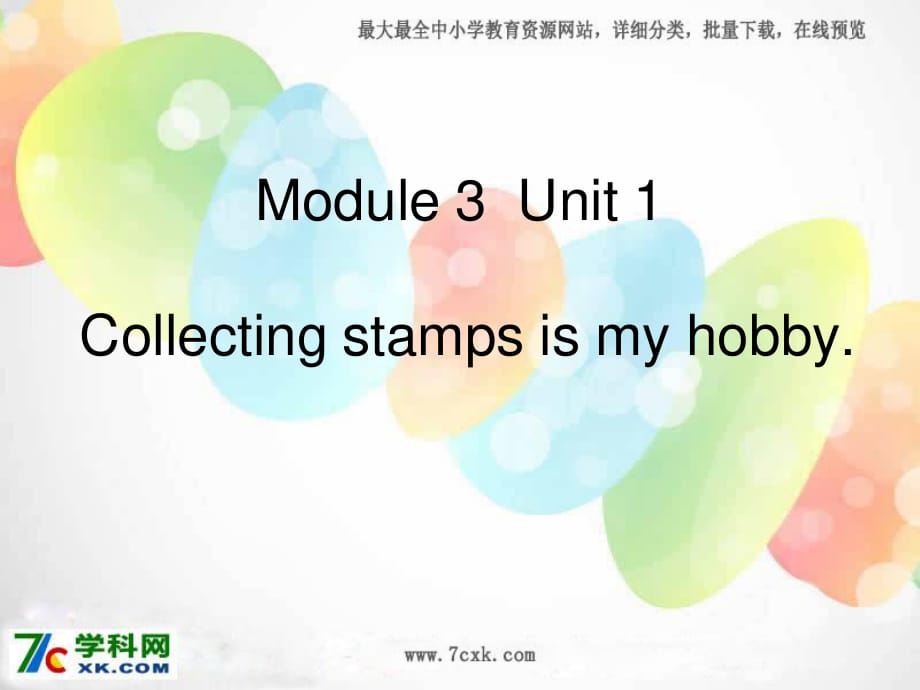《外研版(一起)六上Module 3《Unit 2 Collecting stamps is my hobby》ppt課件5.ppt》由會(huì)員分享����,可在線閱讀,更多相關(guān)《外研版(一起)六上Module 3《Unit 2 Collecting stamps is my hobby》ppt課件5.ppt(15頁(yè)珍藏版)》請(qǐng)?jiān)谘b配圖網(wǎng)上搜索�。
1、Module 3 Unit 1 Collecting stamps is my hobby. Stamps from China: Stamps from China: Stamps from America: Module 3 Unit 1 Collecting stamps is my hobby 1.Read the dialogue and find “stamp/stamps”. 2.Listen to the radio and find out the answers to the following questions. (1)Does Simon collec
2�����、t stamps? (2)What is Simons hobby? (3)Has Simon got any stamps from China? Unit 1 Collecting stamps is my hobby ---Have you got any stamps from China? ---Yes, I have. ---Has he/she got any stamps from China? ---Yes, he/she has. 注意:主謂一致����。 第一�����、第二人稱(chēng) (I/you�、 we/you/they)用 have����; 第三人稱(chēng) (he/she/Simon/Da
3、ming)用 has. 現(xiàn)在完成時(shí) (一)含義: 過(guò)去發(fā)生或已經(jīng)完成的動(dòng)作對(duì)現(xiàn)在造成的 影響或結(jié)果�,或從過(guò)去已經(jīng)開(kāi)始,持續(xù)到現(xiàn)在的動(dòng)作或 狀態(tài)��。 (二)構(gòu)成: 助動(dòng)詞 have/has done(過(guò)去分詞) (三)用法: 1�����、 時(shí)間狀語(yǔ): recently/sincefor/in the past few years e.g. The famous writer has written one new book in the past two years . 2�����、 基本結(jié)構(gòu): have/has + done e.g. (1)I have written one new b
4���、ook recently. (2)He / She /Simon has written one new book recently. 3、 否定形式: have/has + not +done. (1) I have not written one new book recently. (2)He / She /Simon has not written one new book recently. 4、 一般疑問(wèn)句: have或 has提前 (1)I have written one new book recently. Have you? (2)He / She /Simo
5���、n has written one new book recently. Has He / She /Simon ? Excise: 1�����、 We ______ Xiao Li since she was a little girl. A. know B. had known C. have known D. knew 2���、 Zhao Lan _________in this school for two years . . was ; studying . will ; study . has ; studied . are ; studying 3、 _
6���、____ he cleaned the classroom����? A. Has B. Do C. Does D. have Answers: 1��、 C 2��、 C 3��、 A Summary: Summary: 1���、用 have的情況: ---Have you got any stamps from China? ---Yes, I have./No, I havent. 2����、用 has的情況 : ---Has he/she got any stamps from China? ---Yes, he/she has. /No, he/she hasnt. Homework Homework: Thank you!
 外研版(一起)六上Module 3《Unit 2 Collecting stamps is my hobby》ppt課件5.ppt
外研版(一起)六上Module 3《Unit 2 Collecting stamps is my hobby》ppt課件5.ppt

